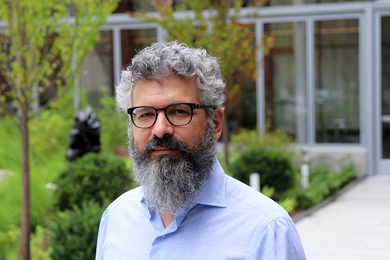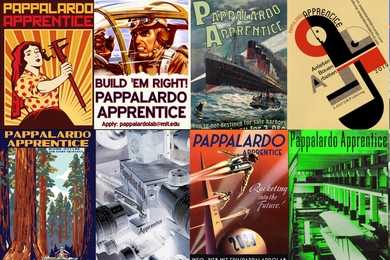Allen Lin ’11, MEng ’11 has received a prestigious Marshall Scholarship, which will support two years of graduate study in the United Kingdom.
Lin earned his bachelor’s from MIT in June, with a double major in chemical engineering and electrical engineering and computer science, and minors in political science and biomedical engineering. He earned a master’s in electrical engineering and computer science in September.
A native of Holmdel, N.J., Lin joins 63 previous MIT-affiliated Marshall Scholars, according to the Institute’s Distinguished Fellowships office. The scholarships have been awarded by the British government since 1953 as a national gesture of thanks to the United States for aid received under the post-World War II Marshall Plan. Up to 40 American students are selected each year for graduate study at British institutions.
Lin will pursue a master’s in technology policy at the University of Cambridge, followed by a master’s in science and technology studies at the University of Edinburgh. He hopes to eventually complete a PhD in synthetic biology and pursue a career in research and policy advocacy.
Lin’s “academic brilliance does not come at the cost of his humanity,” says Linn Hobbs, a professor of materials science and nuclear science and engineering and chair of MIT’s Presidential Committee on Distinguished Scholarships. “Allen is a warm and delightful young man, who is quick to laugh and faster to smile. His gregarious personality is part of his success. … Because he listens well, judges with his active intellect and makes respectful suggestions, others around him — even those vastly more experienced than he — value his opinion.”
Lin’s interests in both engineering and policy have led him to conduct research in two MIT labs that address different facets of synthetic biology. In his work since 2009 with Kenneth Oye, an associate professor of political science and engineering systems, Lin has assessed the security and safety implications of synthetic biology. The following year, he joined the research group of Ron Weiss, an associate professor of biological engineering, studying modularity in synthetic biology circuits.
In 2009, Lin received a two-year scholarship from the U.S. Department of Homeland Security to support his research into novel methods of combating biological terrorism, conducted at Lawrence Livermore National Laboratory. He was named a Goldwater Scholar in 2010, recognizing outstanding merit in engineering and science.
Lin, working with teammates, has twice been selected as a winner of the International Genetically Engineered Machine (iGEM) Competition, earning the opportunity to work at Caltech (2008) and Stanford University (2009) on engineering intestinal bacteria that would provide medical benefits to their hosts. In 2010, he was a winner of both MIT’s IDEAS Competition (for his team’s work on a rapid, low-cost diagnostic test for diabetes) and the Soldier Design Competition (for “Nuclene,” a waterless laundry system for use by soldiers in the field).
At MIT, Lin has been an active mentor to freshmen, as well as to students in chemical engineering and in electrical engineering and computer science. Through MIT’s International Science and Technology Initiatives (MISTI), he taught physics to high school students in Italy. Since 2008, he has organized the MIT THINK Competition, which challenges American high school students to find technical solutions to social problems.
“We are proud of Allen’s accomplishments and look forward to seeing how he will use these extraordinary educational opportunities over the next two years,” says Kimberly Benard, assistant director of distinguished fellowships in MIT Global Education & Career Development. “He represents the best of what MIT’s unique mission can offer to the world.”
Lin earned his bachelor’s from MIT in June, with a double major in chemical engineering and electrical engineering and computer science, and minors in political science and biomedical engineering. He earned a master’s in electrical engineering and computer science in September.
A native of Holmdel, N.J., Lin joins 63 previous MIT-affiliated Marshall Scholars, according to the Institute’s Distinguished Fellowships office. The scholarships have been awarded by the British government since 1953 as a national gesture of thanks to the United States for aid received under the post-World War II Marshall Plan. Up to 40 American students are selected each year for graduate study at British institutions.
Lin will pursue a master’s in technology policy at the University of Cambridge, followed by a master’s in science and technology studies at the University of Edinburgh. He hopes to eventually complete a PhD in synthetic biology and pursue a career in research and policy advocacy.
Lin’s “academic brilliance does not come at the cost of his humanity,” says Linn Hobbs, a professor of materials science and nuclear science and engineering and chair of MIT’s Presidential Committee on Distinguished Scholarships. “Allen is a warm and delightful young man, who is quick to laugh and faster to smile. His gregarious personality is part of his success. … Because he listens well, judges with his active intellect and makes respectful suggestions, others around him — even those vastly more experienced than he — value his opinion.”
Lin’s interests in both engineering and policy have led him to conduct research in two MIT labs that address different facets of synthetic biology. In his work since 2009 with Kenneth Oye, an associate professor of political science and engineering systems, Lin has assessed the security and safety implications of synthetic biology. The following year, he joined the research group of Ron Weiss, an associate professor of biological engineering, studying modularity in synthetic biology circuits.
In 2009, Lin received a two-year scholarship from the U.S. Department of Homeland Security to support his research into novel methods of combating biological terrorism, conducted at Lawrence Livermore National Laboratory. He was named a Goldwater Scholar in 2010, recognizing outstanding merit in engineering and science.
Lin, working with teammates, has twice been selected as a winner of the International Genetically Engineered Machine (iGEM) Competition, earning the opportunity to work at Caltech (2008) and Stanford University (2009) on engineering intestinal bacteria that would provide medical benefits to their hosts. In 2010, he was a winner of both MIT’s IDEAS Competition (for his team’s work on a rapid, low-cost diagnostic test for diabetes) and the Soldier Design Competition (for “Nuclene,” a waterless laundry system for use by soldiers in the field).
At MIT, Lin has been an active mentor to freshmen, as well as to students in chemical engineering and in electrical engineering and computer science. Through MIT’s International Science and Technology Initiatives (MISTI), he taught physics to high school students in Italy. Since 2008, he has organized the MIT THINK Competition, which challenges American high school students to find technical solutions to social problems.
“We are proud of Allen’s accomplishments and look forward to seeing how he will use these extraordinary educational opportunities over the next two years,” says Kimberly Benard, assistant director of distinguished fellowships in MIT Global Education & Career Development. “He represents the best of what MIT’s unique mission can offer to the world.”






